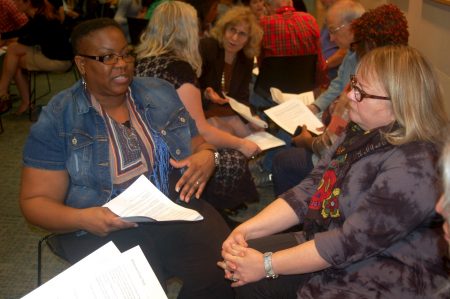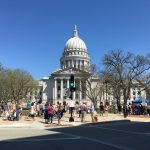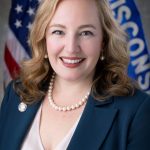Bay View Talks About Racial Justice
YWCA holds talk backs on race, racial justice in Bay View, Shorewood.

Darci Curwen-Garber (center) talks with (from left) Jackie Sanders, Caryn Blegen, Ba Shiira Dixon and Rose Lee. Photo by Clara Hatcher.
Lisa Williams said that growing up as a black person, she was conditioned to “move out of the way” of white people. At 50, Williams said that she still feels like she has to prove herself every day.
“White people get to move through the world every day, comfortably,” Williams said. “I move through the world as if I am a thief or a criminal. Uncomfortably.”
Williams made her comments at a recent YWCA Southeast Wisconsin “talk back” on racial justice, held at Bay View Public Library, 2566 S. Kinnickinnic Ave. An earlier conversation on racial justice hosted by the YWCA was held at the Shorewood Public Library. More than 200 people participated in the two events.
Attendees at both events were asked to read “11 Common Ways White Folks Avoid Taking Responsibility for Racism in the U.S.” written by Robin DiAngelo.

Terri Ellzey (left) and Shelly Schnupp discuss the article “11 Common Ways White Folks Avoid Taking Responsibility for Racism in the U.S.” at a YWCA Southeast Wisconsin “talk back” on racial justice. Photo by Clara Hatcher.
“What stands out often are the places of vulnerability people put themselves in,” Martha Barry, YWCA racial justice director, said about the conversations.
Those in attendance included black, white, Hispanic and Asian people, ranging from high school sophomores to retired Milwaukeeans.
Like Williams, Terri Ellzey, 46, said she has faced racism throughout her life. As a black woman, Ellzey said that she is often questioned about the way she speaks and where she received her degrees.
“Growing up and even a few years ago too, there have been a number of occasions where someone will say, ‘Oh, you speak so well, where are you from?’” Ellzey said.
Ellzey said Milwaukee, where she has been living for 35 years, introduced her to racism.
Ellzey and Shelly Schnupp, who is white, discussed the “bystander effect”—when people, black or white, see racism and do not say anything about it.
Schnupp, who has been the associate director at UWM Helen Bader Institute for Nonprofit Management for more than 10 years, said she wants to change how she thinks about racism.
“If you say you don’t think about race, it is amazing because you live in this psychological cul-de-sac where you don’t have to think about something I have to think about every day,” Ellzey said. “It is almost weird and scary to think that people don’t think about it.”
According to Barry, after participating in conversations such as those offered by the YWCA, attendees start to recognize that “understanding racism can be a journey.”
“In order to understand the world, you are going to have to diversify your world,” Barry said.
Ellzey and Schnupp agreed that having an open conversation helped them understand more about each other’s point of view on racial issues.
“Part of thinking about race, for me, is being patient on my end, and thinking that white people may want to learn,” said Ellzey. “We have to … have these dialogues so that we know each other’s experiences.”
This story was originally published by Milwaukee Neighborhood News Service, where you can find other stories reporting on fifteen city neighborhoods in Milwaukee.






















As a one-time employee of the YWCA, I was always mystified by the mission of the organization to “eliminate racism by any means necessary.” I found it especially ironic since the local YWCA was run by rich white women who presided over a “welfare to work” program started by Republican Governor Tommy Thompson. That was in the late 90s. Things apparently haven’t changed too much since them.
I moved to Milwaukee 3 years ago from Detroit. First, I’ve never seen a community who has more “summits” on “issues” in about 20 plus years of community development and engagement work as a profession. Related to race, though, I’m upset. I wish I could get paid $1 for the number of times over my life I have had conversations with people of varied backgrounds that are rich and build from what is presented in this article. I believe the world needs much more substantive conversations about relationships between different groups of people. Race is a social construct. When you read what people are saying about their experience in engaging others, it’s a very dynamic set of things to be addressed that arise that talking in a space with 1-2 or a small group of people in just a few minutes cannot address. It can provide inspiration. But, does that change what you see when you drive around a city? Does that change disinvestment? Does that change what people do, say, and think about where they live? It is time for all of us for ask for better. Not necessarily more. But definitely better.